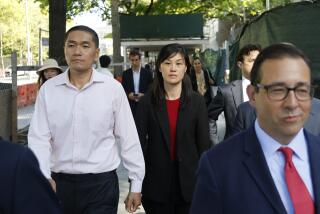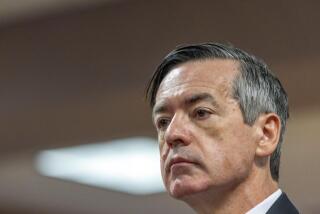Two former Chris Christie aides convicted in ‘Bridgegate’ trial

New Jersey Gov. Chris Christie has been under fire stemming from the closure of lanes leading to the George Washington Bridge in Fort Lee, N.J., in Sept. 2013.
Reporting from Newark, N.J. — New Jersey Gov. Chris Christie was not on trial himself, but his political career was jolted by the conviction Friday of two close associates who orchestrated the traffic jam from hell at the George Washington Bridge to punish a mayor who wouldn’t endorse the governor’s reelection bid.
The jury in U.S. District Court in Newark delivered verdicts of guilty on conspiracy and wire fraud charges against Bridget Anne Kelly, 44, Christie’s former deputy chief of staff, and Bill Baroni, also 44, a former official of the Port Authority of New York and New Jersey, which runs the world’s busiest bridge.
Even though there was no sex, money or violence, “Bridgegate” was in many ways the classic New Jersey scam, a cynical display of raw power politics.
For four days in September 2013, the aides closed the access lanes to the bridge, plunging the waterfront town of Fort Lee, N.J., into complete gridlock. A toddler was lost in the chaos. An elderly patient died of a heart attack in four days of snarled traffic — all as retribution aimed at the town’s mayor, Mark Sokolich, a Democrat who did not endorse Christie’s reelection, according to prosecutors.
The ensuing scandal scuttled Christie’s presidential ambitions and was most likely a factor in Donald Trump’s decision not to select Christie as his running mate.
During the seven-week trial, Kelly, a divorced mother of four children, was portrayed by the defense as a hapless scapegoat caught in the machinations of more powerful men. She and Baroni both claimed that they believed David Wildstein, another Christie associate, who concocted a cover story that the lane closings were part of a traffic survey.
Wildstein, who pleaded guilty and turned government witness, testified that he informed Christie of the lane closings during a ceremony to commemorate the Sept. 11 terrorist attacks – and that Christie was pleased.
“I was pleasing my one constituent,” Wildstein said of Christie. “I was rather happy that he was happy.”
Federal prosecutors have indicated they did not have enough evidence to pursue charges against Christie and that simply learning about a conspiracy after the fact cannot be considered a crime.
It was Kelly who was the author of a now-infamous email in which she told Wildstein: “time for some traffic problems in Fort Lee.’’
During the traffic chaos, the Fort Lee mayor sent a series of increasingly frantic messages to Baroni at the Port Authority in which he wrote of “total gridlock” and a “town ready to revolt.”
Baroni forwarded them to Wildstein, who in turn sent them to Kelly.
“Is it wrong that I am smiling?” she wrote back.
U.S. District Court Judge Susan Wigenton set sentencing for Feb. 21. Baroni and Kelly could face 20 years in prison, but guidelines suggest sentences of one to three years are more likely.
During the deliberations, the judge instructed the jurors that they did not need to find that the scheme was designed to punish the mayor, merely that the defendants covered up the lane closings.
Lawyers for the defense said they planned an appeal.
“In keeping with the disgrace that was this trial, one of the things the U.S. Attorney’s Office should be ashamed of is where it decided to draw the line on who to charge and who not to charge. … They should have had belief in their own case to charge powerful people,” Michael Baldassare, Baroni’s lawyer, told reporters.
The trial gave the public a rare peek into the machinations of the governor’s office. Christie was cast in an unflattering light as a manipulative, foul-mouthed bully who cared little about his constituents or staff, only about his own political ambitions. Kelly testified that he once threw a water bottle at her when he didn’t like her suggestion that he moderate a panel. He was prone to expletive-laced tantrums.
“Who the ... do you think you are calling me a fat … ?’’ Christie yelled at a Republican freeholder who criticized Christie’s weight as well as his response to Hurricane Sandy in 2012, according to testimony. “I’m the ... governor of this state.”
Christie’s reelection bid in 2013 was seen as a dress rehearsal for a presidential run, and his aides scrambled to secure endorsements from Democratic figures around the state. They wooed potential backers with box seats to Giants games at the New Jersey Meadowlands and private meals at the governor’s mansion. The Port Authority, a vast organization run by New York and New Jersey to oversee Hudson River crossings, was used as what Wildstein described as a “goody bag” of potential favors— patronage jobs, vehicles, surplus equipment.
Not even the memory of Sept. 11 appeared to be sacrosanct. Since the Port Authority owns the land at the World Trade Center, Christie’s staff was able to get scraps of salvaged metal from the attacks as gifts for political allies. New York Gov. Andrew Cuomo didn’t escape the scandal either. Wildstein claimed he urged the Port Authority, jointly run by the two states, to back off from an investigation of the lane closings.
In a statement issued by his office Friday, Christie said, “Like so many people in New Jersey, I’m saddened by this case and I’m saddened about the choices made by Bill Baroni, Bridget Kelly and David Wildstein. Today’s verdict does not change this for me.
“But let me be clear once again, I had no knowledge prior to or during these lane realignments, and had no role in authorizing them. No believable evidence was presented to contradict that fact. Anything said to the contrary over the past six weeks in court is simply untrue.”
Once one of the GOP’s bright stars, Christie has seen his popularity plunge in his home state because of the trial and his support of Trump’s polarizing candidacy. A poll in September found 68% of registered New Jersey voters disapproved of him.
Some scoffed at Christie’s protestations of innocence after the verdict Friday.
“You know Christie knew,” said Fred Mulligan, a postal worker from Union, N.J., who works in Newark. “Anyone running an establishment knows what their workers are doing. It was just swept under the rug.”
“He’s in charge — how could he not know?” wondered Elijah Charles of Newark, who works at the city’s Prudential Center arena.
New Jersey has a reputation for political scandal so much so that a columnist for NJ.com wrote, “in New Jersey, it seems, politics and corruption go together like bacon and eggs in one of the state’s numerous diners.’’
The most famous case until now, perhaps, was Abscam, an FBI sting in the 1970s and ‘80s in which fake Arab sheiks bribed politicians. Now “Bridgegate” has kept the reputation alive.
“We’ve now ensured that we’re going to remain the butt of every political joke for the next 20 years,” Mark Sokolich, the Fort Lee mayor who was the target of the vendetta, has previously said.
Demick reported from New York and Hansen from Newark.
ALSO
If the polls are any indication, these key governor’s races will be very close on Tuesday
What the WikiLeaks emails tell us about Hillary Clinton’s campaign (and what they don’t)
UPDATES:
2:25 p.m.: This article was updated with additional details of testimony about Gov. Chris Christie’s behavior and New Jersey’s political history.
11:50 a.m.: This article was updated with additional details and reaction.
10:05 a.m.: This article was updated with staff reporting and additional details.
This article was originally published at 9:50 a.m.
More to Read
Sign up for Essential California
The most important California stories and recommendations in your inbox every morning.
You may occasionally receive promotional content from the Los Angeles Times.










